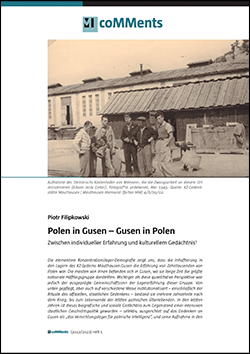Poland in Gusen - Gusen in Poland. Between individual experience and cultural memory.
##plugins.themes.bootstrap3.article.main##
Abstract
The basic demographics of the concentration camp show us that imprisonment in the camps of the Mauthausen-Gusen concentration camp system was an experience shared by tens of thousands of Poles. Most of them were held in Gusen where, for a long time, they made up the largest national group of prisoners. More significant than this quantitative aspect, however, was the strong sense of community the camp experience engendered in this group. Cultivated from below, but also institutionalised in a variety of ways – including official, state commemoration rituals – it existed for several decades after the war until the deaths of the last Polish survivors. In recent years, this biographical and social memory has become the focus of an intensive, state politics of history – a selective politics aimed at commemorating Gusen as “the extermination camp for the Polish intelligentsia” and making this commemoration part of the canon of Polish cultural memory. The question of the role of the Gusen Memorial in this process remains open.
